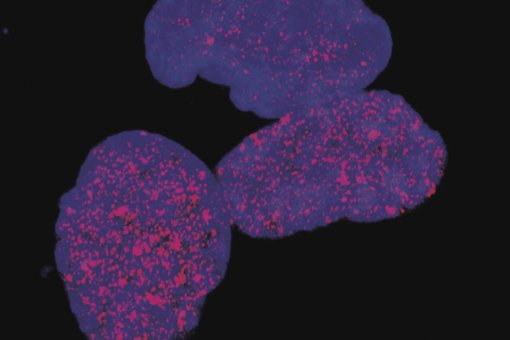Images
Contact

Researchers at IRB Barcelona have demonstrated that the decrease in Dab1 protein expression caused by the infective action of prions also reduces the production of β-amyloid, a risk factor of Alzheimer’s disease.
Researchers at the Institute for Research in Biomedicine (IRB Barcelona) reveal that a protein that is affected in neurodegenerative diseases caused by prions can delay the appearance of amyloid deposits present in Alzheimer’s disease. The study has been performed on neuronal cultures and animal models. José Antonio del Río, member of the "Developmental neurobiology and neuronal generation" research Group at IRB Barcelona and of the Dept. of Cell Biology at the University of Barcelona, has directed the study, which has been released in an early form in the online version of the journal Neurobiology of Disease.
The study demonstrates that alteration of the Dab1 protein in hamsters infected by prions (infection agents responsible for diseases such as "Mad Cow Disease") decreases the production of β-amyloid, which is responsible for the development of the amyloid deposits that characterize Alzheimer’s disease. José A. del Río, leader of the study, explains that, "we demonstrate, for the first time, that Dab1 is a protein links two types of neurodegenerative disease". Often, a disease alters diverse proteins and cell factors, which, in turn, have repercussions on a second disease. This is what is known by scientists as "cross-talk" between pathologies.
During the experiments, these researchers demonstrated, on the one hand, that the animals infected by prions show reduced Dab1 expression, and, on the other hand, that rat neuronal cultures that do not express this protein show decreased production of β-amyloid. "We are now undertaking similar studies, but with tissue samples from human patients in order to corroborate our findings in animal models and neuronal cultures", explains Del Río. Another challenge that faces this research group will be to test, also in animal models, whether the absence of Dab1 impedes infection by prions or prevents the development of Alzheimer’s disease and to confirm Dab1 as a possible therapeutic target for both kinds of neurodegenerative disease.
The study has included the participation of Rosalina Gavín, Jesús Ureña, Alejandra Rangel and Eduardo Soriano, all at IRB Barcelona, and researchers at the Faculty of Medicine of the University of Santiago de Compostela and the Institute of Neuropathology of Zurich.
Reference article:
Fibrillar prion peptide PrP(106–126) treatment induces Dab1 phosphorylation and impairs APP processing and Aβ production in cortical neurons
Rosalina Gavin, Jesus Ureña, Alejandra Rangel, Miguel A. Pastrana, Jesús R. Requena, Eduardo Soriano, Adriano Aguzzi, and José A. Del Río
Neurobiology of Disease, doi: 10.1016/j.nbd.2008.02.001 (2008)
About IRB Barcelona
The Institute for Research in Biomedicine (IRB Barcelona) pursues a society free of disease. To this end, it conducts multidisciplinary research of excellence to cure cancer and other diseases linked to ageing. It establishes technology transfer agreements with the pharmaceutical industry and major hospitals to bring research results closer to society, and organises a range of science outreach activities to engage the public in an open dialogue. IRB Barcelona is an international centre that hosts 400 researchers and more than 30 nationalities. Recognised as a Severo Ochoa Centre of Excellence since 2011, IRB Barcelona is a CERCA centre and member of the Barcelona Institute of Science and Technology (BIST).




